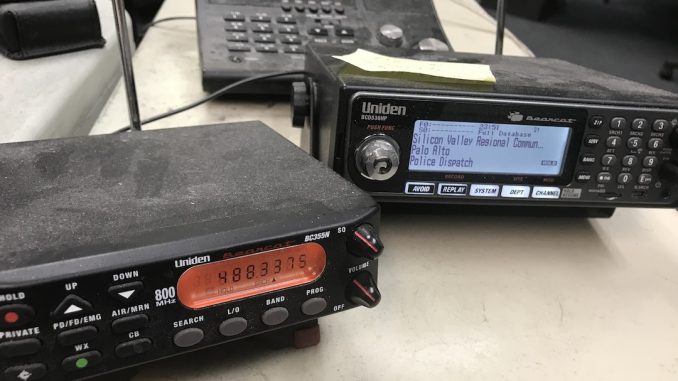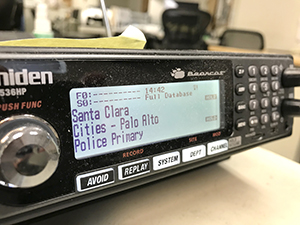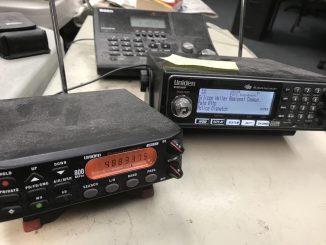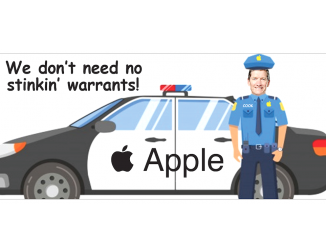
By the Daily Post staff
Palo Alto City Council will meet in the 60 days to review a decision by Palo Alto police to encrypt their police radio transmissions — a decision Mayor Tom DuBois and Vice Mayor Pat Burt say was a mistake.
Encrypting police radio transmissions prevents journalists and the public from keeping an eye on law enforcement.
Meanwhile, Mountain View police announced yesterday that in March they will join the small number of police departments that have decided to encrypt their transmissions.
Both Palo Alto and Mountain View say their decisions were based on an October policy memo from the state Department of Justice that gave departments two choices — either encrypt their frequencies to prevent the dissemination of personal information or continue broadcasting without encryption and communicate personal information in another manner.
Palo Alto Police Chief Robert Jonsen picked the more restrictive of the two choices. Encryption in Palo Alto began Jan. 5 with no advance notice or public hearings on the decision. Mountain View announced its decision on Monday (Jan. 11), again with no advance notice or public input.
City Manager Ed Shikada said at Monday’s council meeting that council members will discuss encryption at a meeting in the next 60 days, though he didn’t give an exact date. Any council meeting would include a public hearing where people could give their opinions to council.
Aram James, a former public defender who keeps an eye on police, said he’d like the hearing to also include experts on the other side, such as David Snyder of the First Amendment Coalition.
James also cited the Palo Alto Police Department’s switch last fall to a system where reporters have to submit their questions on the city website rather than interview police officers on the phone or face to face. He also cited as evidenced of the city’s lack of transparency a five-year-long coverup of an investigation of the use of the n-word by Capt. Zach Perron in front of a black officer who later quit.
“It’s been my personal experience that the city manager and the police chief have been anything but transparent over the last year or two,” James said.
“I’m very optimistic at the beginning of the year, the newly constituted City Council is not going to let the city manager and the police chief run over the people, and more specifically our representatives on the City Council,” James said.
Shikada said that budget cuts have reduced the police department’s ability to provide public information.
In his presentation to council, Shikada said that alternatives to encryption — such as having officers receive confidential information over the phone or switching to another police radio channel — “adds burdens to officers and dispatchers and compromises the safety of police personnel.”
Another alternative Palo Alto could pursue, the city manager said, was challenging the Department of Justice memo or supporting an unsuccessful bill in the Legislature (AB1555) that would have required police to provide unencrypted communications to the news media.
Mayor Tom DuBois said on Friday that it was a mistake to switch to encryption, saying newspapers rely on police radios.
Vice Mayor Pat Burt said he wants the encryption dealt with at a public hearing, and not swept under the rug.
“I think that the way that they did it without understanding the point of view of the council and the press and how this might impact transparency in the community is clearly a mistake,” Burt told the Post.
The vast majority of police agencies in California don’t encrypt their transmissions, despite the Department of Justice October memo that Jonsen described as a “mandate.”
California has 509 police agencies. The Post has only been able to find 21 agencies besides Palo Alto that have switched to encrypted broadcasts. They include the Orange County and Santa Clara County sheriff’s offices, and police departments in:
Santa Clara County: Campbell, Gilroy, Los Gatos, Morgan Hill, San Jose and Sunnyvale.
Southern California: Beverly Hills, Palm Springs, Pasadena, Riverside, Santa Monica and Simi Valley.
Monterey County: Carmel, Del Rey Oaks, Marina, Monterey, Pacific Grove, Salinas and Seaside.
Twenty-two agencies out of 509 is about 4% of California.
Local agencies that continue to operate without encryption include East Palo Alto, Menlo Park, Los Altos, Atherton, Redwood City, San Mateo County Sheriff, Belmont, San Mateo and Menlo Park Fire.
This story has been updated to include additional police departments that encrypt their radio frequencies.




Mountain View say that Palo Alto got away with it and decided to follow suit.
Encrypted radio communications are needed only if the police have something to hide. If that’s the direction things are going, then complete unredacted recordings and transcripts of all communications need to be maintained and provided to anyone who goes through proper information request channels. That would protect privacy for real-time communication but still let the communication be available to the public.
The public loses a valuable tool for the sake of the police departments’ convenience.
we want our cops making their own rules or do they need to follow the DEpt. of justice? Seems like you can’t have it both ways. Maybe the frustration should be directed at the state and the dept of justice for setting police departments up for failure. They should make rules that create transparency not obstruct it.
PD’s have to pursue sending personal info differently. Police regular radios must remain in the clear.
IF COPS TRY TO HIDE THEIR INTENTIONS, WE WILL ASSUME THEY’RE PLOTTING MORE ATTEMPTED MURDERS AGAINST MY JEWISH FAMILY, AND WE WILL HAVE NO CHOICE BUT TO STOCKPILE LETHAL WEAPONS TO DEFEND OURSELVES!